An Irish Sojourn (2003)
Dublintown
My mother's mother's mother's folks, Patrick and Mary McMahan, were
born in County Clare. So, as far as I'm concerned that's about as
real a connection to old Eire as you can get. It's one of the truisms
of Ireland that it doesn't take much to be her son or daughter. My
Mom's ancestors emmigrated from Ireland's County Clare in the 1820s,
a generation before the great potato famine. They landed in
Philadelphia and then joined the movement West, settling in Nebraska.
When Patrick passed away Mary was left alone with her brood on the
prairie. Local thugs dressed as Indians and peppered her ranch house
with bullets. Having little choice she sold out cheap and moved into town (Omaha).
Our Irish family names include---most famously---O'Gorman, McMahon,
and Welch. And so a trip was planned to explore the country of our
roots. My brother Paul made it possible by subsidizing the airfares.
He's made a very good living programming IBM mainframes. When he was
in school all his counselors said, `Don't go into programming IBM
mainframes because they are dinosaurs and are soon to be replaced by
PCs networked together.' So, being brilliant, he went into the field
and nobody else did. As, despite the predictions, everybody still used
IBM mainframes he's had his choice of jobs at a very nice wage. (Now,
he denies this story, but I say why let the facts get into the way of
a good myth?)
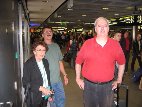 Here we are at Dublin's airport. The photo is of my traveling
companions: my sainted mother Jeanne, my long-suffering brother-in-law
Don, and my generous brother Paul. We've just survived the zoolike
atmosphere at Los Angeles International and the interminable
transcontinental / transatlantic crossing. The actual traveling part
of traveling is a bit of a bore, isn't it?
Here we are at Dublin's airport. The photo is of my traveling
companions: my sainted mother Jeanne, my long-suffering brother-in-law
Don, and my generous brother Paul. We've just survived the zoolike
atmosphere at Los Angeles International and the interminable
transcontinental / transatlantic crossing. The actual traveling part
of traveling is a bit of a bore, isn't it?
Off we go to our accommodations at `The College of the Holy and
Undivided Trinity,' which opened its doors in 1593.  Trinity is a quaint, old college in
the heart of Dublin. They were celebrating Robert Emmett Days when we
were there. They proudly point out that this Irish hero had been a
student at Trinity until they expelled him for his rebelliousness.
They've got a gem of a library including their `Long Room,' seventy
yards in length. Hundreds of thousands of old volumes displayed
beautifully; not to mention the old _Book of Kells_, the _Book of
Durrow_, the Book of Leinster_, and the _Book of Armagh_. It made me
very jealous to see librarians going through the stacks, seemingly at
random, pulling out volumes, taking them from their slipcases, untying
their ribbons, and giving them a brief examination before tying them
back up, replacing them in their slipcases, reshelving them and moving
on to the next volume. Oh, and they have such things as the Brian
Boru Harp, supposedly the oldest harp in existence.
Trinity is a quaint, old college in
the heart of Dublin. They were celebrating Robert Emmett Days when we
were there. They proudly point out that this Irish hero had been a
student at Trinity until they expelled him for his rebelliousness.
They've got a gem of a library including their `Long Room,' seventy
yards in length. Hundreds of thousands of old volumes displayed
beautifully; not to mention the old _Book of Kells_, the _Book of
Durrow_, the Book of Leinster_, and the _Book of Armagh_. It made me
very jealous to see librarians going through the stacks, seemingly at
random, pulling out volumes, taking them from their slipcases, untying
their ribbons, and giving them a brief examination before tying them
back up, replacing them in their slipcases, reshelving them and moving
on to the next volume. Oh, and they have such things as the Brian
Boru Harp, supposedly the oldest harp in existence.
We checked in at the registry office and lugged our luggage off to
our rooms. Ha! Turns out to be a fifth-floor walk-up; no elevator;
eighty-three steps from street level to our floor! At about the third
floor one of the maids we passed said to me that we could have left
our luggage at reception and they would have brought it up to our
rooms. `Now you tell us!' I reply. I've recently found out that in
the days before electricity and elevators there were few buildings
taller than five stories because nobody wanted to walk up six flights.
At least we knew at once that my sister Mary, Don's wife, would have
hated this vacation. She had almost come but declined because of her
bad knees.
We spent three days taking in the sights of Dublin which wasn't
nearly long enough. Fortunately, we didn't drive in Dublin, but
relied on buses, taxis, and our feet.  One of our taxi drivers had an
unbelievable brogue. My brother and I would say every once in a
while, ~Uh uh' like we understood, but it was largely a put on. One
thing I did understand the driver saying was, `If Brendan Behan were
alive in Dublin today, he'd be pissing in his pants.' Ireland's
changing alright, with lots of new construction and Dublin more than
anywhere else. The streets were all torn up for the extension of
their rapid transit system, Dublin Area Rapid Transit (DART), which,
like all such projects, was overdue and overbudget. We walked the
first day, took the tourist bus the second, and did our own thing on
the third. Here we are at St. Audoen's Arch, a remnant of the old
wall around Dublin built in 1275. Along the way we had drinks at the
Brazen Head, Ireland's oldest pub; visited Christchurch Cathedral and
Saint Patrick's; wandered through `the Liberties'; visited the Guinness
brewery, Dublin Castle, the Ha'penny Bridge, Phoenix Park and assorted
other places. The Guinness Brewery tour was typical of many tours we
took in Ireland. They take an old building, no longer in use, create
exhibits of how the product was made, and end with a wee tasting.
Pretty much of a bore really with a few worthwhile exhibits. The
highlight of the Guinness tour for me was the video of the barrel makers.
One of our taxi drivers had an
unbelievable brogue. My brother and I would say every once in a
while, ~Uh uh' like we understood, but it was largely a put on. One
thing I did understand the driver saying was, `If Brendan Behan were
alive in Dublin today, he'd be pissing in his pants.' Ireland's
changing alright, with lots of new construction and Dublin more than
anywhere else. The streets were all torn up for the extension of
their rapid transit system, Dublin Area Rapid Transit (DART), which,
like all such projects, was overdue and overbudget. We walked the
first day, took the tourist bus the second, and did our own thing on
the third. Here we are at St. Audoen's Arch, a remnant of the old
wall around Dublin built in 1275. Along the way we had drinks at the
Brazen Head, Ireland's oldest pub; visited Christchurch Cathedral and
Saint Patrick's; wandered through `the Liberties'; visited the Guinness
brewery, Dublin Castle, the Ha'penny Bridge, Phoenix Park and assorted
other places. The Guinness Brewery tour was typical of many tours we
took in Ireland. They take an old building, no longer in use, create
exhibits of how the product was made, and end with a wee tasting.
Pretty much of a bore really with a few worthwhile exhibits. The
highlight of the Guinness tour for me was the video of the barrel makers.
 I have new respect
for the coopers and their art. For centuries barrels were all
handmade and almost all done by eye without measuring. The amount of
work to make one barrel was phenomenal. These days, of course, the
Guinness barrels are machine-made in Eastern Europe and imported.
I have new respect
for the coopers and their art. For centuries barrels were all
handmade and almost all done by eye without measuring. The amount of
work to make one barrel was phenomenal. These days, of course, the
Guinness barrels are machine-made in Eastern Europe and imported.
On our final day in Dublin I went off by myself, took the DART and
visited James Joyce's tower out at Sandymount.  Ah, the beach is always great. Looking
back at my misspent youth, my days as a beach bum stand out as
particularly enjoyable. I also took the tour at
Kilmainham Jail . I wish I had gotten everyone to go. The young,
amazingly red-cheeked lass who was our tour guide was so earnest,
persuasive, compelling, and full of Irish history. The jail itself was
a fascinating hodgepodge of cells, from the worst hellhole solitary to
quite nice accommodations with fireplaces and windows. I had to wipe a
tear away as we stood in the courtyard and listened to our guide talk
of the heroes of 1916 who were executed here. I also made a pilgrimage
to the old Post Office, sight of the 1916 uprising, with its bullet
holes and statue of mythical Culchalain. Culchalain was such a great
warrior for the Irish that their enemies wouldn't even approach his
dead body until they saw a raven pecking at his flesh.
Ah, the beach is always great. Looking
back at my misspent youth, my days as a beach bum stand out as
particularly enjoyable. I also took the tour at
Kilmainham Jail . I wish I had gotten everyone to go. The young,
amazingly red-cheeked lass who was our tour guide was so earnest,
persuasive, compelling, and full of Irish history. The jail itself was
a fascinating hodgepodge of cells, from the worst hellhole solitary to
quite nice accommodations with fireplaces and windows. I had to wipe a
tear away as we stood in the courtyard and listened to our guide talk
of the heroes of 1916 who were executed here. I also made a pilgrimage
to the old Post Office, sight of the 1916 uprising, with its bullet
holes and statue of mythical Culchalain. Culchalain was such a great
warrior for the Irish that their enemies wouldn't even approach his
dead body until they saw a raven pecking at his flesh.
I stopped by the Dublin Woolen Company on the Liffy quayside near
the Ha'Penny Bridge. One of my quests in Ireland was to find a nice
tweed jacket, but they had none on the store floor. Too early in the
season they said. Just like American stores!
At night we saw several productions: Ragus, an entertaining
celebration of Irish music, at the old Olympia Theater where the
seats were so close together I had to sit in the front row to have
enough legroom. Later we went to an entertaining revival of the Oscar
Wilde comedy, `The Importance of Being Earnest.' I wanted to squeeze
in a performance at the legendary Gaity Theatre , where they
were performing _She Stoops to Conquer_ but I guess you can't do
everything.
On to Waterford
After Dublin, we rented a car and began our trip around Ireland.
We traveled in a clockwise motion from Dublin. I had urged that we
also visit Northern Ireland, but my companions did not want to visit
the place of `The Troubles' even when I pointed out that they hadn't
lost a tourist yet. 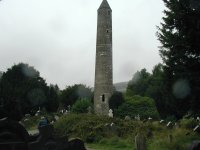 So off we went, through the Wicklow Mountains,
my brother Paul at the wheel. Of course, it was soon discovered that
there were no shoulders on these rural Irish roads, just stone walls,
shrubbery, or potholes. We got to the Sally Gap where we compared
notes with another tourist about where we were and where to go from
here. He was going off to Roundwood, but we were headed for
Glendalough, the Valley of Two Lakes and the city of Saint Kevin.
Supposedly there's a cave on the cliff face that has `Saint Kevin's
Bed' in it, but our party just enjoyed the cemetery and the signature
round tower. There were plenty of tourists coming in by bus. Me, I
had fun walking a labyrinth on the site. As we were getting ready to
leave I spotted my brother taking a long look at the left front wheel
of the rental car. Sure enough, the rim was bent (darn pothole) and the
tire was leaking air. So we got out the spare (one of those tiny
tires meant to used in emergencies only) and put it on.
So off we went, through the Wicklow Mountains,
my brother Paul at the wheel. Of course, it was soon discovered that
there were no shoulders on these rural Irish roads, just stone walls,
shrubbery, or potholes. We got to the Sally Gap where we compared
notes with another tourist about where we were and where to go from
here. He was going off to Roundwood, but we were headed for
Glendalough, the Valley of Two Lakes and the city of Saint Kevin.
Supposedly there's a cave on the cliff face that has `Saint Kevin's
Bed' in it, but our party just enjoyed the cemetery and the signature
round tower. There were plenty of tourists coming in by bus. Me, I
had fun walking a labyrinth on the site. As we were getting ready to
leave I spotted my brother taking a long look at the left front wheel
of the rental car. Sure enough, the rim was bent (darn pothole) and the
tire was leaking air. So we got out the spare (one of those tiny
tires meant to used in emergencies only) and put it on.
Next stop was Avoca, home of the BBC series `Ballykissangel.' I had
really enjoyed the way the series gave you these lovable Irish
characters and the English priest like a fish out of water and, just
when you thought it was all in fun, they'd throw in a little sin and
kill somebody off or otherwise shock you. A grand literary
tradition of the Irish, I think. Ah, they're so charming and love-able
and then you discover the child abuse or the 15 year-old girl pregnant
by the priest and sent off to slavery in the Magdalena laundries. The
tv show was popular culture, of course, and so not quite as good as the
shock you get in, for example, Herman Hesse's_Steppenwolf_ with its
totally boring protagonist, but certainly more than passable for TV
fare. We ate at Fitzgerald's, 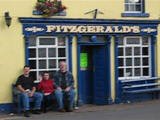 whose bar looked just like the one in the
series even down to the pictures on the wall, but which had also
expanded into newly remodeled space next door for its dining
facilities. I figured that the series hadn't done it any harm. Avoca
was a cute little narrow-streeted town. Of course, we soon found out
that every Irish town was a cute little narrow-streeted town. It was
from there that Don called the car rental agency to ask about fixing
the bent rim. They told him that they couldn't do anything until we
got to their facility in Cork.
whose bar looked just like the one in the
series even down to the pictures on the wall, but which had also
expanded into newly remodeled space next door for its dining
facilities. I figured that the series hadn't done it any harm. Avoca
was a cute little narrow-streeted town. Of course, we soon found out
that every Irish town was a cute little narrow-streeted town. It was
from there that Don called the car rental agency to ask about fixing
the bent rim. They told him that they couldn't do anything until we
got to their facility in Cork.
In Waterford we stayed at Brown's Townhouse .
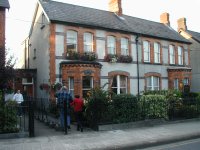 The
owners were off making money with some Internet enterprise and the bed
and breakfast was being managed by a couple over from Holland. He was
a very nice guy, parallel parked our rental car into an incredibly
small space for us, but bent my ear with complaints: it was expensive
living in Ireland and he and his wife had to work second jobs to make
ends meet and everybody at the B&B was always complaining about
something, etc., etc.
The
owners were off making money with some Internet enterprise and the bed
and breakfast was being managed by a couple over from Holland. He was
a very nice guy, parallel parked our rental car into an incredibly
small space for us, but bent my ear with complaints: it was expensive
living in Ireland and he and his wife had to work second jobs to make
ends meet and everybody at the B&B was always complaining about
something, etc., etc.
Little did we know it, but the biggest surprise of the trip was
waiting for us this night. After dinner we walked down a block or so
to the local pub called Mansion House .
Nice place, very comfortable. Three old guys came in and started
playing Irish music with traditional instruments. They had an Irish
bagpipe, a squeezebox, and a mandolin. They knew all manner of Irish
folk songs and when we explained to them about my Mom's connection to
County Clare they played a lovely air called, _The Rose of County
Clare_ while Mom and I danced.. Meanwhile, Paul was getting in the
drinks and chanced into conversation with Noel, a fifty-something dock
worker. He used to go out on the fishing boats but now operates a
forklift. Well one thing led to another, we lifted more than few
Guinness pints, and next thing I know Noel's asking me how old my mom
is. `She's 84,' I say. `Well, it looks like she's got some good
years left in her yet,' he replies. Then he turned on the charm. He
tried to get her to dance with him, give him a little kiss, and
finally told her that he had a room at his house for her if she wanted
to stay awhile. Well, you could have knocked us over with a feather.
Of all the things I imagined might happen in Ireland, my mother
getting hit on by a dock worker wasn't one of them.
Next day, I got up at the crack of dawn and drove to a tire shop
recommended by the B&B manager. This was a big place that reminded me
of General Tire or Firestone. I rolled the tire with the bent rim
into the shop but was told there was nothing they could do, we'd have
to get a new rim which they didn't stock. I returned to Brown's
Townhouse to a wonderful breakfast with the other guests. I always
got the big breakfast: eggs, toast, sausage, black pudding, etc. Hey,
I'm on vacation! Breakfasts were a chance to talk with the other
guests, compare notes and swap stories. After breakfast we went down
and took the walking tour of Waterford. 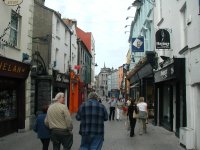 I enjoyed the guide very much.
Along with showing us the historic sights of Waterford, like the
typical round tower, he also talked about modern Ireland. He took us
down to the offices of the European Union, of which Ireland is a
member. He told us that it had been a great deal for Ireland because
when they joined they were one of the poorest countries in the union
and so much more money in the way of economic development programs
came into the country than went out in dues. These days he said that,
even with the `Celtic Tiger' sleeping, Ireland has done so well that
it pays more dues than it gets in benefits. In fact, per capita,
Ireland is currently the second richest country in the EU, behind just
Luxembourg. That is incredible! One of the changes they made was to
make education free all the way through college. Our guide pointed
out though, that the east and south of Ireland had done much better
economically than the north and west. He also took us to a street
that was all torn up and told us that it used to be an old cobblestone
street but about 30 years ago, in a fit of progress, they had torn up
the cobblestones and asphalted it. Now, he says, they are tearing up
the asphalt and re-cobblestoning it for the tourists. Sounds like
city government is the same all over.
I enjoyed the guide very much.
Along with showing us the historic sights of Waterford, like the
typical round tower, he also talked about modern Ireland. He took us
down to the offices of the European Union, of which Ireland is a
member. He told us that it had been a great deal for Ireland because
when they joined they were one of the poorest countries in the union
and so much more money in the way of economic development programs
came into the country than went out in dues. These days he said that,
even with the `Celtic Tiger' sleeping, Ireland has done so well that
it pays more dues than it gets in benefits. In fact, per capita,
Ireland is currently the second richest country in the EU, behind just
Luxembourg. That is incredible! One of the changes they made was to
make education free all the way through college. Our guide pointed
out though, that the east and south of Ireland had done much better
economically than the north and west. He also took us to a street
that was all torn up and told us that it used to be an old cobblestone
street but about 30 years ago, in a fit of progress, they had torn up
the cobblestones and asphalted it. Now, he says, they are tearing up
the asphalt and re-cobblestoning it for the tourists. Sounds like
city government is the same all over.
Then it was off to the Waterford
Crystal factory.  Unlike Guinness or Jameson's, the Waterford Crystal
tour took you right through the factory where real workers were
blowing glass and etching it. It was real fun to see. My sister Mary
had left strict instructions about what Waterford pieces were required
by her. Some of them had already been bought and shipped from the House of Ireland in Dublin,
but others were now bought. A kind of crystal fever came over
everyone and additional purchases were made. Fortunately, we got out
of there without breaking the bank but I think it was a close thing.
Unlike Guinness or Jameson's, the Waterford Crystal
tour took you right through the factory where real workers were
blowing glass and etching it. It was real fun to see. My sister Mary
had left strict instructions about what Waterford pieces were required
by her. Some of them had already been bought and shipped from the House of Ireland in Dublin,
but others were now bought. A kind of crystal fever came over
everyone and additional purchases were made. Fortunately, we got out
of there without breaking the bank but I think it was a close thing.
Kilkenny Tire Cats
From Waterford we drove up to Kilkenny. I was behind the wheel now
and getting used to the odd sensation of driving on the wrong side of
the road. Eventually I got the hang of it but as we entered Kilkennuy
I was driving a little too fast, the road was a little too narrow, and
I slightly swerved to avoid oncoming traffic and hit the curb with our
tire which immediately made a `whoosh, whoosh, whoosh' noise. `We've
got no spare,' Don shouts, `We're dead in the water.' So I pull over
and park and as we get out of the car, my companions are asking, `What
do we do now?' I say `Don't panic!' and point to a tire shop right
across the road, `maybe they can help us.' So we unload the luggage
from the back and I take out the first tire with the bent rim and roll
it over to the tire shop. The guy there says he was working outside
and heard it happen and I explain that no, he heard the second one,
this is the first. Well, he lays that tire down, bent rim side up,
takes a sledgehammer and, `Boom, Boom, Boom' the rim looks fine. He
takes it off to fill with air and dunk in a water bath to be sure it's
not leaking when I notice my mom in earnest conversation with a young
worker who looks totally confused. I go over to hear my mom asking if
they have a restroom. The guy is scratching his head, so I say, `She
means the toilet, do you have a toilet?' `Oh,' says he, `the toilet's
right over there' and points the way. Yea, who has a room to rest in,
anyway? So I roll the tire back, promising to bring the next one.
Halfway there my brother Paul, after replacing the luggage, is heading
toward the shop. He wants to know what I'm doing. `I'm going to go
get the spare,' I say. `What!' he says, ` They can't fix this one but
can fix the spare?' `No,' I reply, `this one's fixed!' He couldn't
believe it could be fixed so quickly, and it was rather unbelievable.
The tire guy fixed the spare as well and we were back on the road.
The B&B we had hoped to stay at in Kilkenny was full so we went down
the B&B row until we saw a vacancy sign. You have to marvel how they
got all those beds in those little tiny rooms. Next day we visited
grand Kilkenny Castle.
The Rock of Cashel
Then it was off to Cashel. On the way we stopped to look at the ruin
of Kilcash. While not very impressive, the site has historical
importance in that all Irish children used to have to memorize a verse
about Kilcash in Gaelic as part of their education. Surprisingly,
it's a lament for the good old days of the ruling class. Here's Frank
O'Connor's translation:
|
What shall we do for timber?
The last of the woods is down.
Kilcash and the house of its glory
And the bell of the house are gone.
The spot where that lady waited
Who shamed all women for grace
When earls came sailing to greet her
And Mass was said in the place.
|
My grief and my affliction
Your gates are taken away,
Your avenue needs attention,
Goats in the garden stray.
The courtyard's filled with water
And the great earls where are they?
The earls, the lady, the people
Beaten into the day.
|
I beseech of Mary and Jesus
That the great come home again
With long dances danced in the garden,
Fiddle music and mirth among men,
That Kilcash the home of our fathers
Be lifted on high again,
And from that to the deluge of waters
In bounty and peace remain.
|

|
On then we went to Cashel in County Tipperary where we stayed at
Dualla House, a two-hundred year-old Georgian house 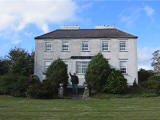 situated in the Golden Vale. It was
there that we three brothers shared a room for the first and last
time. It may be that Paul and I snore some, but it hasn't bothered
either of us too much. On the other hand, it seems my brother-in-law
is terribly bothered by snorers and has developed a way to deal with
my sister's snoring. When she snores he pounds the mattress, thereby
disturbing her enough to roll over and stop snoring. Well it didn't
seem to work with Paul and I as Don repeatedly disturbed our sleep
with his mattress pounding antics. I'll only say that neither Paul or
I were happy campers in the morning. So, that morning, completely
unrefreshed, we headed out to early Mass (for Mom and me). I'm a
Goddess worshiper myself, instead of that old sky god YahWeh, but I
can appreciate the Roman Catholic mass as a piece of audience
participation theater (stand, kneel, sit, etc.) with all that
hocus-pocus. And when I'm with Mom, I always attend mass on Sundays
as a sign of respect for her. My brother and brother-in-law, however,
have no such compulsion. Afterward, we went to the Rock of Cashel.
An old myth says that it is the devil's tooth, spit out upon this
plain.
situated in the Golden Vale. It was
there that we three brothers shared a room for the first and last
time. It may be that Paul and I snore some, but it hasn't bothered
either of us too much. On the other hand, it seems my brother-in-law
is terribly bothered by snorers and has developed a way to deal with
my sister's snoring. When she snores he pounds the mattress, thereby
disturbing her enough to roll over and stop snoring. Well it didn't
seem to work with Paul and I as Don repeatedly disturbed our sleep
with his mattress pounding antics. I'll only say that neither Paul or
I were happy campers in the morning. So, that morning, completely
unrefreshed, we headed out to early Mass (for Mom and me). I'm a
Goddess worshiper myself, instead of that old sky god YahWeh, but I
can appreciate the Roman Catholic mass as a piece of audience
participation theater (stand, kneel, sit, etc.) with all that
hocus-pocus. And when I'm with Mom, I always attend mass on Sundays
as a sign of respect for her. My brother and brother-in-law, however,
have no such compulsion. Afterward, we went to the Rock of Cashel.
An old myth says that it is the devil's tooth, spit out upon this
plain. 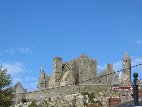 It has a very
dramatic collection of old stone buildings on top all built at
different times and squeezed into the available space. Most of the
buildings are unattractive but there's a gem of a small chapel. The
site was the seat of Munster kings for centuries and then handed over
to the Church. Finally, one archbishop decided the walk up to the
rock was too strenuous and it was abandoned. We took the tour and
spent an hour or so on top in a cold wind. Mom came down with a cold.
It has a very
dramatic collection of old stone buildings on top all built at
different times and squeezed into the available space. Most of the
buildings are unattractive but there's a gem of a small chapel. The
site was the seat of Munster kings for centuries and then handed over
to the Church. Finally, one archbishop decided the walk up to the
rock was too strenuous and it was abandoned. We took the tour and
spent an hour or so on top in a cold wind. Mom came down with a cold.
County Cork
By now I was driving all the time and boy was that fun. Steering
wheel on the wrong side of the car, driving on the wrong side of the
road, I loved it. Mind you, I told my brothers I didn't want to hog
the driving and prevent them from having the experience, but they were
content to let me do the chauffeuring.
Cork seemed a thoroughly modern if somewhat grimy city, with lots of
bridges. We paused there and had a drink or two while watching the
Irish hurling championship between Cork and the Kilkenny Cats. 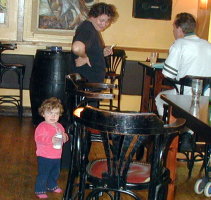 While watching, a
toddler---with parents beaming nearby---toddled up to me, climbed on
my lap, shared my food and laughed with me as we watched. Even though
we were in Cork, I was quietly rooting for Kilkenny because of their
wonderful tire repair skills and they proved triumphant. Then we
drove on to Glandore Bay and the little fishing village of Union Hall.
We stayed at Maria's Schoolhouse
While watching, a
toddler---with parents beaming nearby---toddled up to me, climbed on
my lap, shared my food and laughed with me as we watched. Even though
we were in Cork, I was quietly rooting for Kilkenny because of their
wonderful tire repair skills and they proved triumphant. Then we
drove on to Glandore Bay and the little fishing village of Union Hall.
We stayed at Maria's Schoolhouse 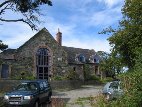 which we planned to use as a
base for relaxation and exploring the area. The next day was
scheduled as a rest day. After all, Mom is 84 and has caught a little
cold. But when we told her she said, `Sit around and rest? I can do
that at home. I want to see the sights.' So, as there was a little
Gaelic-speaking town I'd wanted to see, this seemed a good
opportunity.
which we planned to use as a
base for relaxation and exploring the area. The next day was
scheduled as a rest day. After all, Mom is 84 and has caught a little
cold. But when we told her she said, `Sit around and rest? I can do
that at home. I want to see the sights.' So, as there was a little
Gaelic-speaking town I'd wanted to see, this seemed a good
opportunity.
The way I heard the story, Ireland used to have these great Bardic
Colleges, where men and women would go to study in the dark for seven
years and learn to make verse. While most couldn't read or write,
they came out of this college knowing all the old stories, poems and
songs. And people recognized the power of poetry in a way I think we've
forgotten. In those days, about the worst thing that could happen to
you is for one of these poets to make a satirical verse about you.
Your life was over, because everywhere you went people would recite
this poem about you. It reminds me of the American president, Lyndon
Baines Johnson, during the Vietnam War. Everywhere he went there
followed him a little piece of doggerel that he hated: `Hey, hey LBJ,
how many kids did you kill today?' I believe this literally hounded
him from office as he declined to run for a second term. Eventually
these Bardic Colleges disappeared but their place was taken by
something called the Courts of Poetry, where poets would get together
to recite, share, and judge each other's poems. Of course, these were
also great excuses for merrymaking of all sorts. But these too died
out as Ireland modernized. Except the rumor was that a Court of
Poetry was still held every year, after Christmas, in the little
Gaelic-speaking town of Coulea. So I wanted to visit this holdover
from Ireland's ancient past, have a drink in their pub, and pay them
homage that way.
We decided to head directly north through the Shehy Mountains but lost
the thread shortly after Dunmanway. As we were traveling along a
narrow dirt lane, not really sure where we were, I spotted a farmer
near the road tending some equipment. I called him over and explained
that we were looking for a road north. I showed him the map, but he
looked at it like it was some alien artifact. I wasn't sure if he'd
know the little town of Coulea so I said that we were trying to
get to Gougane Barra, a well-known forest park which was on the way to
Coulea. `Ah well,' he says, `you can't get there from here.' Swear to
God, that's what he said. He goes on, `I've been there twice. You've
got to go to Bantry to get there. This road here is the old Bantry
road, there's a paved road down there. You must have missed a turn.
You might try paying attention to the signs.' We thanked him and
continued on the old Bantry road.
From Bantry we drove north to
Goughane Barra, a lovely spot with a lake and charming chapel.
 The park also had a
sacred well and prayer pilgrimage you could take. There were a dozen
or so `monk's cells' which were rock crannies of various sizes open on
one side which circled an open-air courtyard with a cross in its
center.
The park also had a
sacred well and prayer pilgrimage you could take. There were a dozen
or so `monk's cells' which were rock crannies of various sizes open on
one side which circled an open-air courtyard with a cross in its
center.  The
forest park also had a prize-winning toilet.
The
forest park also had a prize-winning toilet. 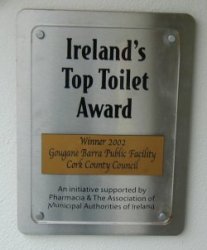
Refreshed, we continued our search for Coulea. We discovered that
there are no signs directing you to Coulea. We turned off the main
highway again but the roads were completely unmarked so we missed the
correct turn and ended up back on a secondary road. By now it was
becoming a mission. We got back on a main highway and tried to find
it from the north, this time turning south at Ballyvourne. We found
ourselves on a tiny track with grass growing down its middle. We
might never have found Coulea except that we ran into a road crew
working away and blocking the road. The backhoe operator, a big ruddy
man, asked, `A wee bit lost, are we?' He gave us the directions to
Coulea. It just meant backing down the road (literally) about 200
yards, taking a left fork and turning left when that lane ended. And
so we finally found the little village of Coulea. As we toured its
main street we saw no pub, no store, no business of any kind. I found
out later that even the post office had shut down. We'd found what
may be the only town in Ireland where it's impossible to spend any
money. Suddenly, we saw someone walking in the street, so we drove up
and asked if there was a pub nearby. He laughed and said, yes, he'd
heard there was one right up the road called the
Coom, that it was Ireland's highest pub, and he was going there
later. Right now he had a meeting with a man that he couldn't miss.
Coulea certainly worked its magic on us. We neglected to even take a
picture. I feel like we were in an Irish Brigadoon. Off we went up
the road to find the pub. There were several forks along the way, all
unmarked of course, but I always took the high road as we were headed
for Ireland's highest pub. We got to a crossroads with signs and
almost abandoned our search, to head to somewhere familiar. But
fortunately Don insisted that we must go to Ireland's highest pub and
a few hundred yards further on, there it was. We took a picture by
the sign, but unfortunately the pub itself was closed. 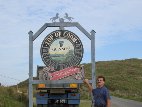 There were sounds of a TV or
radio coming from lace-curtained windows upstairs but no one came out
to greet us.
There were sounds of a TV or
radio coming from lace-curtained windows upstairs but no one came out
to greet us.
That evening we ate out as per usual. Two things stand out about the
meals in and around Union Hall: one, best fish and chips ever---just
ask Paul---and second, potatoes. I mean, potatoes seem to come with
every meal in Ireland, but Union Hall was something special. We had
one meal there with mashed potatoes on the plate, a side of chips, and
a heaping plate of boiled potatoes. When they brought the boiled
potatoes we asked, `Why so many potatoes?' `Oh,' she replied, `these
are for the table.' Well, in that case, bring them on. The next day
we went back to Cork and toured the Jamison whiskey factory and then
went up to see Blarney Castle. 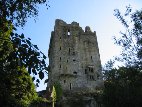 The grounds are nice but the castle is completely
unrestored. Mom was still feeling she might not be up to stairs and
all so she stayed below. When we got to the top, there was an
attendant saying, `Who'll kiss the Blarney stone? Come on now.' Don
and Paul kissed away and I have to admit that after that it was
especially hard to shut them up!
The grounds are nice but the castle is completely
unrestored. Mom was still feeling she might not be up to stairs and
all so she stayed below. When we got to the top, there was an
attendant saying, `Who'll kiss the Blarney stone? Come on now.' Don
and Paul kissed away and I have to admit that after that it was
especially hard to shut them up!
We stopped for breakfast one morning in Rosscarbery where attached to
the cafe was a bookstore, run by C.P. Hyland. I had a
look through his stock and found a few interesting items which I
bought. With the exception of Dublin (and later Galway) I found very
few books in our journeys. So, I asked him about scouting for books in
Ireland. He told me he did his book scouting in England. The problem
with books in Ireland, he said, is that they are either moldy from the
damp and bad heating or been used as frisbees by the kids.
Later we drove down the long avenue to Cobh (pronounced `cove'), the
harbor where most Irish left when emigrating. I couldn't help
thinking as we drove about my forebears Patrick and Mary McMahon
leaving Ireland. Did they walk or ride a horse-drawn cart? What were
their feelings, never to see their families again? Did they have a
farewell party with tears and whiskey and dancing? What did they
think the future would bring them? Cobh was a picturesque harbor town
and we toured their exhibit on the emigrants.
New Construction at Castletownshend
One day we drove down to Castletownshend on the coast. I had heard
that it was another of those West Cork, lost-in-time places,
controlled for centuries by just a few families: the Townshends (with
their castle), the Somervilles, the Coghills, and the Chavasses. The
main street falls steeply down to the harbor with an island of The Two
Trees (sycamores) in the middle. We parked at the end and tried to
visit the Anglican church with its renowned stain glass windows, but
it was locked. Far from being untouched, the town had lots of new
construction going on. Methinks the current generation is cashing in.
The Irish Peninsulas
We left Maria's Schoolhouse the next day. I found out then that
my mom had been cold the entire time because of an open window in her
room. Typical of mom, she never complains. In these, her later
years, her most life-threatening moments had been because she didn't
want to bother her doctor or anyone else with her health problems. I
hope she's over that! We continued our journey, stopping for
breakfast in Skibbereen. Skibbereen has a great traditional song
about it and the reasons why people left Ireland. It documents
everything from disease and lack of food to the landlords and British
forcing them out. We passed through Bantry again and onto the Berra
Peninsula. 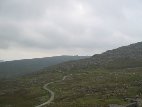 We took the
winding road over Healy Pass and then out to the tip of the peninsula
where we rode the ramshackle cable car out to Dursey Island. In the
parking lot by the cable car a young man was playing his flute to a
CD. His companion engaged us in conversation and then tried to sell
us a copy of the CD, Forgotten Moons, by the Dursey Sound Connection.
We resisted for a bit but when he said we could have North American
duplication/piracy rights we caved in and paid our 15 euros. When we
were in Ireland, the exchange rate was about 1.18 dollars to the euro.
And, of course, there was always a little bit more taken when the
money was converted. But it was painless. My ATM and credit cards
worked fine in their machines. I wouldn't have to face the music
until I returned to the states.
We took the
winding road over Healy Pass and then out to the tip of the peninsula
where we rode the ramshackle cable car out to Dursey Island. In the
parking lot by the cable car a young man was playing his flute to a
CD. His companion engaged us in conversation and then tried to sell
us a copy of the CD, Forgotten Moons, by the Dursey Sound Connection.
We resisted for a bit but when he said we could have North American
duplication/piracy rights we caved in and paid our 15 euros. When we
were in Ireland, the exchange rate was about 1.18 dollars to the euro.
And, of course, there was always a little bit more taken when the
money was converted. But it was painless. My ATM and credit cards
worked fine in their machines. I wouldn't have to face the music
until I returned to the states.
We stayed that night at John and Mary O'Sullivan's place in Allihies
called the Sea View
House. 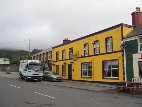 We
walked next door, past O'Sullivan's Garage and lifted a few pints at
O'Sullivan's Pub. On Beara Peninsula the O'Sullivans seem to be the
name of record. In other parts of Ireland it was the same only with
different names. So as we're drinking, Pogues on the stereo, my
brother Paul mentions our odyssey to Coulea. `Coulea?' says someone,
`I was in Coulea just last Tuesday.' And here's the man we saw
walking in the streets of Coulea. He introduced himself as Connor and
told us he was taking a few weeks off to travel around the places of
his childhood. He was staying in the local hostel at Allihies and had
a lovely lassie he had met there in tow. He had gone to Coulea to
talk with his old Gaelic teacher. He explained that Coulea used to be
a place where children from all over Ireland would go to learn Irish.
But, as the years went on, fewer and fewer children came and eventually
the program ended in the mid-nineties. His old teacher was still
there though and he had shared a pint or two and listened to the old
stories again. He had, true to his word, showed up at the pub at the
top of the Coom later, although it was much later, but said it still
wasn't open when he arrived. We spent the evening talking about
Ireland and it's passing ways.
We
walked next door, past O'Sullivan's Garage and lifted a few pints at
O'Sullivan's Pub. On Beara Peninsula the O'Sullivans seem to be the
name of record. In other parts of Ireland it was the same only with
different names. So as we're drinking, Pogues on the stereo, my
brother Paul mentions our odyssey to Coulea. `Coulea?' says someone,
`I was in Coulea just last Tuesday.' And here's the man we saw
walking in the streets of Coulea. He introduced himself as Connor and
told us he was taking a few weeks off to travel around the places of
his childhood. He was staying in the local hostel at Allihies and had
a lovely lassie he had met there in tow. He had gone to Coulea to
talk with his old Gaelic teacher. He explained that Coulea used to be
a place where children from all over Ireland would go to learn Irish.
But, as the years went on, fewer and fewer children came and eventually
the program ended in the mid-nineties. His old teacher was still
there though and he had shared a pint or two and listened to the old
stories again. He had, true to his word, showed up at the pub at the
top of the Coom later, although it was much later, but said it still
wasn't open when he arrived. We spent the evening talking about
Ireland and it's passing ways.
The next day we drove the famous Ring of Kerry. Unfortunately it was
overcast and threatening rain or actually raining, so we didn't see
much. We paused at Derrynane,
once the home of Daniel O'Connell, the great eighteenth century
Liberator who later moved to County Clare and stood for elective
office there. We drove on then to the Dingle Peninsula.
At the town of Dingle we let the Irish Tourist Board find and make
reservations for us. This is a service provided all over Ireland for
a few euros. I've talked with an American couple who traveled three
weeks in Ireland and always relied on the Tourist Board to find them
accommodations and they had no complaints. One startling thing about
Ireland is the number of Bed & Breakfasts there are. There are dozens
in the cities, there will be a B&B row along one street, and even out
in the middle of nowhere you'll see a B&B sign. Our landlady at
Dingle told us, `Where would we be without your dollars?' Or the
euros from the continent, I thought. She suggested we drive the Dingle
loop counterclockwise as that would mean we were next to the hills
instead of the cliffs. But we got hopelessly lost, finally stopping
in Tiduff for refreshment where the owner had our Welch family coat of
arms proudly on display. We returned to our starting point and drove
clockwise instead around the beautiful Dingle peninsula. We stopped
and looked at the 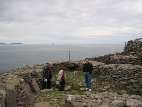 beehive huts, old stone buildings that had been
inhabited into the 18th century, surprisingly late. We also stopped
and marveled at the religious Gallarus Oratory,
beehive huts, old stone buildings that had been
inhabited into the 18th century, surprisingly late. We also stopped
and marveled at the religious Gallarus Oratory, 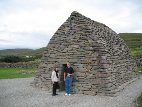 another, more sophisticated,
stone building built without mortar. Incredibly, the stones were just
sitting there. I reached in, removed a stone and then replaced it. I
thought, how would this ever survive in America? Here, as at a lot of
historical sights, you could sit and watch a 15 or 20 minute film of
the area and its attractions. It was always a good way to get a few
minutes sleep. Not that the films were boring, but when the lights
went down the films seemed hypnotic and my general lack of sleep took
over. We left the Dingle Peninsula by driving over the Connor Pass,
through Tralee, Limerick, and west to Clare.
another, more sophisticated,
stone building built without mortar. Incredibly, the stones were just
sitting there. I reached in, removed a stone and then replaced it. I
thought, how would this ever survive in America? Here, as at a lot of
historical sights, you could sit and watch a 15 or 20 minute film of
the area and its attractions. It was always a good way to get a few
minutes sleep. Not that the films were boring, but when the lights
went down the films seemed hypnotic and my general lack of sleep took
over. We left the Dingle Peninsula by driving over the Connor Pass,
through Tralee, Limerick, and west to Clare.
County Clare at Last
Ah, County Clare, home of our ancestors! We stopped first at Bunratty
Castle, a magnificently restored `tower house' from the 15th century.
The grounds have been transformed into a `folk park' with dozens of
buildings from different eras of Irish history. A tourist trap I
suppose but I found it very well done and it provided some fascinating
looks into Ireland's past. There was everything from the Big House on
the hill to a farmer's thatched cottage which the family shared with
their cows and other animals. They had moved to the site a two-story
building which had been the home of the ice cream kings of Ireland and
would sell you some ice cream there as well. The park also contained
a village street with its pub, schoolhouse, and shops, but it didn't
seem too much different from the current reality in lots of small
Irish towns. We made reservations to come back for an Irish music
show and dinner in the Corn Barn and then went off to Ennis and our
accommodations.
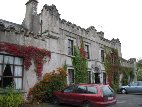 At Ennis,
capital of County Clare, we stayed at Newpark House , steeped in
local history, and once the home of the O'Gorman McMahon. As O'Gorman
and McMahon are two of our main Irish family names, Paul and I joked with
Bernadette Barron, the landlady, that the house probably belonged to
us. `Ah, well then, you can start paying for its upkeep!' she
replied. It's a lovely place, as you can see from the picture and we
enjoyed our stay there very much.
At Ennis,
capital of County Clare, we stayed at Newpark House , steeped in
local history, and once the home of the O'Gorman McMahon. As O'Gorman
and McMahon are two of our main Irish family names, Paul and I joked with
Bernadette Barron, the landlady, that the house probably belonged to
us. `Ah, well then, you can start paying for its upkeep!' she
replied. It's a lovely place, as you can see from the picture and we
enjoyed our stay there very much.
On Sunday, we all went for an early morning walk only to find
ourselves being pursued through the streets of Ennis by a ragtag band
of urchins, singing to us until we tossed them enough coins. Mom and I
went onto Mass at the church in Ennis. Wow. the priest talked faster
than anyone I've ever known. We were out of there in 35 minutes. The
prayers went by so fast that I couldn't make heads or tails of them.
Heck, if this is the norm I'd go to church regularly! Funny thing is,
with all the speed, I still remember the sermon. He said that there
was a great desire among we flawed humans to be better than other
people. "It's nice to be better," he said, "but how much better to be
nice!" A nice turn of phrase, I thought.
Lisdoonvarna
Off then to a tour of the Burren. Lots of strange and wonderful
landscapes. We went into Lisdoonvarna and stopped as the big annual
matchmaking festival was happening. There was a Jeneane Garofalo movie about the
festival some years ago. I dropped my mother and brothers off and
found a parking space. Out in the plaza they were playing country and
western music. Turns out that American country and western is a
favorite of the Irish. We went into a pub for some refreshment and
struck up a conversation with two gentlemen who turned out to be
musicians about to play in the ballroom of a local hotel. So off we
went, looking for the matchmaker along the way. The matchmaker has
certain specified hours at certain places in town. We never did run
into him, but as the musicians said, `You don't need a matchmaker to
find a match!'
So we found the ballroom where our new acquaintances were to play and
went in and found a place to sit. That is, Mom and I did. Paul and
Don decided to stay by the door, look dour, and glance at their
wristwatches every minute or two. In fact, every time I would look
over in their direction they would point to their wristwatches. They
were concerned that we return to Bunratty where we had dinner
reservations for the Irish folk show at the Corn Barn. 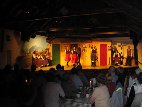 Now, I knew
that we had taken the scenic route getting to Lisdoonvarna and had
plenty of time, so I insisted that we stay at least through the first
number by the musicians that we had talked to in the pub. I thought
it was a hoot: lots of women my age and plenty of dancing to American
country and western tunes. I would have liked to have stayed awhile
and tried to get in a dance or two, but I bowed to pressure from my
brothers and left with them after the first tune for Bunratty; where
we arrived several hours early and so went to the pub in the
demonstration village and killed time by drinking a few rounds. But,
for some reason (well, I was at the wheel), over the next few days it
seemed that everywhere we went we passed through Lisdoonvarna.
Now, I knew
that we had taken the scenic route getting to Lisdoonvarna and had
plenty of time, so I insisted that we stay at least through the first
number by the musicians that we had talked to in the pub. I thought
it was a hoot: lots of women my age and plenty of dancing to American
country and western tunes. I would have liked to have stayed awhile
and tried to get in a dance or two, but I bowed to pressure from my
brothers and left with them after the first tune for Bunratty; where
we arrived several hours early and so went to the pub in the
demonstration village and killed time by drinking a few rounds. But,
for some reason (well, I was at the wheel), over the next few days it
seemed that everywhere we went we passed through Lisdoonvarna.
Cliffs of Moher and Saint Brigid's Well
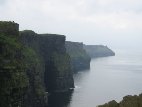 Next day we
went off to see the famous Cliffs of Moher. They were indeed a site
to behold, plunging straight down in to the Atlantic. And we weren't
the only ones to appreciate them, there were thousands of people
there.
Next day we
went off to see the famous Cliffs of Moher. They were indeed a site
to behold, plunging straight down in to the Atlantic. And we weren't
the only ones to appreciate them, there were thousands of people
there. 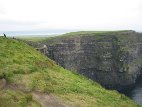 Remember,
this is late September, supposedly well after the height of the
tourist season. There were musicians, and vendors, and lots and lots
of Europeans, many of whom seemed intent on crawling out to the edge
of the cliffs in order to look straight down. I could hardly believe
the number of people there.
Remember,
this is late September, supposedly well after the height of the
tourist season. There were musicians, and vendors, and lots and lots
of Europeans, many of whom seemed intent on crawling out to the edge
of the cliffs in order to look straight down. I could hardly believe
the number of people there. 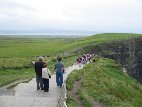 What must it be like at the height of the tourist
season?
What must it be like at the height of the tourist
season?
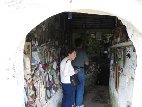 We drove on
then to find a site I was very interested in: Saint Brigid's Well.
Brigid is a pagan goddess that precedes the catholicization of Ireland
by Patrick. She was incorporated into the Catholic pantheon of saints
as a way of winning over the people to the new religion. She has a
sacred well, where people have visited and given thanks for thousands
of years. The tradition is to leave a token of thanks for healing
associated with her veneration. Her feast day is celebrated with the
old pagan holiday at the beginning of February.
We drove on
then to find a site I was very interested in: Saint Brigid's Well.
Brigid is a pagan goddess that precedes the catholicization of Ireland
by Patrick. She was incorporated into the Catholic pantheon of saints
as a way of winning over the people to the new religion. She has a
sacred well, where people have visited and given thanks for thousands
of years. The tradition is to leave a token of thanks for healing
associated with her veneration. Her feast day is celebrated with the
old pagan holiday at the beginning of February.
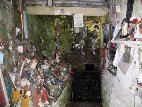 After making
a few inquiries we found her sacred well right on the main road. They
have an effigy of Saint Brigid in nun's garb inside a glass booth
prominently displayed. In contrast to the Cliffs of Moher, there was
no one there. We went inside the small building (built a hundred and
fifty years ago over her well in thanks for a cure) and found
thousands of small items left: pictures, medals, crutches, etc. They
filled the building from floor to ceiling and even on the ceiling.
Her well gurgled and I marveled. This is something I thought was
found modernly only in Mexico or in 3rd world nations.
After making
a few inquiries we found her sacred well right on the main road. They
have an effigy of Saint Brigid in nun's garb inside a glass booth
prominently displayed. In contrast to the Cliffs of Moher, there was
no one there. We went inside the small building (built a hundred and
fifty years ago over her well in thanks for a cure) and found
thousands of small items left: pictures, medals, crutches, etc. They
filled the building from floor to ceiling and even on the ceiling.
Her well gurgled and I marveled. This is something I thought was
found modernly only in Mexico or in 3rd world nations.
Galway Bay
We drove up to Galway. What a wonderful, vibrant town. I made a few
purchases in a lovely bookshop there and completely enjoyed myself,
even if it was raining a bit from time to time. At one haberdashery I
asked my usual question, `Do you have a tweed jacket in my size?' and
got the response, `Oh boy!' They didn't, of course.
 While in Galway we
visited Nora Barnacle's house. She went on to live with and then
marry James Joyce. It supposedly has been restored to a turn of the
century look and become a museum, but it was locked tight when we
arrived and its historic medallion was off the wall. I hope it's okay
and we were just too late for the season.
While in Galway we
visited Nora Barnacle's house. She went on to live with and then
marry James Joyce. It supposedly has been restored to a turn of the
century look and become a museum, but it was locked tight when we
arrived and its historic medallion was off the wall. I hope it's okay
and we were just too late for the season.
Yeats Tower
One day we drove out to see William Butler Yeat's tower Thoor
Ballylee. 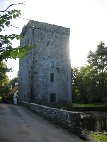 It's
one of those tower houses and has been refurbished and includes a
cottage next door that has been made into a museum and gift shop. By
this time there wasn't much of a challenge that could deter Mom and
she went up with us through the quaint rooms and to the battlements
at top.
It's
one of those tower houses and has been refurbished and includes a
cottage next door that has been made into a museum and gift shop. By
this time there wasn't much of a challenge that could deter Mom and
she went up with us through the quaint rooms and to the battlements
at top. 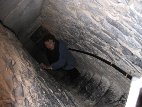 It's funny how, in the course of the journey, she went from being
feeble to being strong. We'll have to arrange a few more trips in the
next decade so she can remember how strong she is.
It's funny how, in the course of the journey, she went from being
feeble to being strong. We'll have to arrange a few more trips in the
next decade so she can remember how strong she is.
Last Days
On our last full day in Ireland we set out to do a bit of a tour but
didn't get far. I wanted to get some shopping in before the trip
home. Nothing special, just a few sweaters for the lasses and some
booze for the lads. There was also the matter of my tweed jacket. Of
course, no one in Ennis had anything approaching my size in stock. But
at one of the city's finer haberdasheries the salesman, after
confirming that they'd nothing in my size, asked me if I'm a Democrat
or Republican. I told him that I don't really like either party but I
vote Democratic. Well, sez he, let me tell you this joke:
| Three doctors are having lunch and bragging
about their accomplishments. The first says, `I treated a concert
pianist who had his hand cut off in an accident with a saw. I
reattached the nerves and blood vessels and today that pianist is
playing in concerts again.'
|
`Ah, well,' says the second doctor, `I treated a
world-class marathoner. He was in a car accident and his leg was cut
right off. I reattached the leg in a long surgery and today that
marathoner is winning races again.'
|
`Well,' says the third doctor, `I had occasion
to treat an equestrian. He was riding his horse and was hit by a
train. All that was left was a horse's ass. And today, that horse's
ass is president of the United States!'
|
He told me he always asked the party affiliation of the punter because
Republicans didn't seem to appreciate the joke very much.
So, I've done me shopping and I'm wandering down an Ennis alley when I
hear some incredible racket coming from a pub. I stick my nose inside
to see what's happening and there's a barefoot man, about 30, longish
hair, bearded, in trousers and coat, shirt open at the neck, playing
something loudly in his hands. Immediately, an older,
grizzled-looking man shouts, `Come in, come in!' I start to back
away, but he gestures and shouts and so, carrying my bags and looking
every bit the tourist, I walk over. He grabs the instruments out of
the young man's hand and shows me that they are bones; highly polished
bones. He puts them in my hands and I marvel at the age and beauty of
them.
He buys me a Guinness and tells me how he doesn't like the new Ireland.
`You mean all this construction,' I say. `Yes, that's right. I've
moved to Florida,' he says, `Ireland's not what it was.'
There's another character hovering. He has an incredibly thick
brogue. I strain to understand even a word or two. He's small,
wearing red pants, a red and white striped shirt and a red cap. His
complexion is ruddy, ruddy, ruddy. And when he talks to me he totally
gets in my space and screws his face up and practically stands on
tiptoe to get as close to my face as possible. I can barely make out
anything he's saying. Except at one point I understand him to say,
`So what'd you come to Ireland for then?' His older friend chimes in,
`He came to see the little people, of course!' and laughs. I notice
then that I'm at least head and shoulders taller than anyone else in
the crowded room.
My grizzled Irish acquaintance starts pressing the young barefoot man
to sing a song for us. But he doesn't want to because of the
red-dressed ruddy man. The older man says he'll keep him from
bothering the singer. So, the barefoot man tells me he'll sing a
song, but not an Irish song, instead a song of lost love from the
American South. And, after the young lady behind the bar turns down
the Pogues, he sings a haunting ballad. Every once in a while the
ruddy man starts to vocalize with the tune, but true to his word the
grizzled man quiets him down. As he's singing this lovely song, I
look around at the bar, at all these men drinking and talking their
afternoon away. They barely pay attention to us, seeming lost in
their own worlds. As I'm taking my leave, I thank my host for showing
me a small piece of the real Ireland.
In the predawn of the next day we drove out to the Shannon Airport to
begin our journey home. At the car rental return they examine our spare tire.
`No punctures?' the rental car guy asks.
`No,' sez Don, `We were lucky.' A little of the luck of the Irish, I
think.
 Here we are at Dublin's airport. The photo is of my traveling
companions: my sainted mother Jeanne, my long-suffering brother-in-law
Don, and my generous brother Paul. We've just survived the zoolike
atmosphere at Los Angeles International and the interminable
transcontinental / transatlantic crossing. The actual traveling part
of traveling is a bit of a bore, isn't it?
Here we are at Dublin's airport. The photo is of my traveling
companions: my sainted mother Jeanne, my long-suffering brother-in-law
Don, and my generous brother Paul. We've just survived the zoolike
atmosphere at Los Angeles International and the interminable
transcontinental / transatlantic crossing. The actual traveling part
of traveling is a bit of a bore, isn't it?  Trinity is a quaint, old college in
the heart of Dublin. They were celebrating Robert Emmett Days when we
were there. They proudly point out that this Irish hero had been a
student at Trinity until they expelled him for his rebelliousness.
They've got a gem of a library including their `Long Room,' seventy
yards in length. Hundreds of thousands of old volumes displayed
beautifully; not to mention the old _Book of Kells_, the _Book of
Durrow_, the Book of Leinster_, and the _Book of Armagh_. It made me
very jealous to see librarians going through the stacks, seemingly at
random, pulling out volumes, taking them from their slipcases, untying
their ribbons, and giving them a brief examination before tying them
back up, replacing them in their slipcases, reshelving them and moving
on to the next volume. Oh, and they have such things as the Brian
Boru Harp, supposedly the oldest harp in existence.
Trinity is a quaint, old college in
the heart of Dublin. They were celebrating Robert Emmett Days when we
were there. They proudly point out that this Irish hero had been a
student at Trinity until they expelled him for his rebelliousness.
They've got a gem of a library including their `Long Room,' seventy
yards in length. Hundreds of thousands of old volumes displayed
beautifully; not to mention the old _Book of Kells_, the _Book of
Durrow_, the Book of Leinster_, and the _Book of Armagh_. It made me
very jealous to see librarians going through the stacks, seemingly at
random, pulling out volumes, taking them from their slipcases, untying
their ribbons, and giving them a brief examination before tying them
back up, replacing them in their slipcases, reshelving them and moving
on to the next volume. Oh, and they have such things as the Brian
Boru Harp, supposedly the oldest harp in existence.  One of our taxi drivers had an
unbelievable brogue. My brother and I would say every once in a
while, ~Uh uh' like we understood, but it was largely a put on. One
thing I did understand the driver saying was, `If Brendan Behan were
alive in Dublin today, he'd be pissing in his pants.' Ireland's
changing alright, with lots of new construction and Dublin more than
anywhere else. The streets were all torn up for the extension of
their rapid transit system, Dublin Area Rapid Transit (DART), which,
like all such projects, was overdue and overbudget. We walked the
first day, took the tourist bus the second, and did our own thing on
the third. Here we are at St. Audoen's Arch, a remnant of the old
wall around Dublin built in 1275. Along the way we had drinks at the
Brazen Head, Ireland's oldest pub; visited Christchurch Cathedral and
Saint Patrick's; wandered through `the Liberties'; visited the Guinness
brewery, Dublin Castle, the Ha'penny Bridge, Phoenix Park and assorted
other places. The Guinness Brewery tour was typical of many tours we
took in Ireland. They take an old building, no longer in use, create
exhibits of how the product was made, and end with a wee tasting.
Pretty much of a bore really with a few worthwhile exhibits. The
highlight of the Guinness tour for me was the video of the barrel makers.
One of our taxi drivers had an
unbelievable brogue. My brother and I would say every once in a
while, ~Uh uh' like we understood, but it was largely a put on. One
thing I did understand the driver saying was, `If Brendan Behan were
alive in Dublin today, he'd be pissing in his pants.' Ireland's
changing alright, with lots of new construction and Dublin more than
anywhere else. The streets were all torn up for the extension of
their rapid transit system, Dublin Area Rapid Transit (DART), which,
like all such projects, was overdue and overbudget. We walked the
first day, took the tourist bus the second, and did our own thing on
the third. Here we are at St. Audoen's Arch, a remnant of the old
wall around Dublin built in 1275. Along the way we had drinks at the
Brazen Head, Ireland's oldest pub; visited Christchurch Cathedral and
Saint Patrick's; wandered through `the Liberties'; visited the Guinness
brewery, Dublin Castle, the Ha'penny Bridge, Phoenix Park and assorted
other places. The Guinness Brewery tour was typical of many tours we
took in Ireland. They take an old building, no longer in use, create
exhibits of how the product was made, and end with a wee tasting.
Pretty much of a bore really with a few worthwhile exhibits. The
highlight of the Guinness tour for me was the video of the barrel makers.
 I have new respect
for the coopers and their art. For centuries barrels were all
handmade and almost all done by eye without measuring. The amount of
work to make one barrel was phenomenal. These days, of course, the
Guinness barrels are machine-made in Eastern Europe and imported.
I have new respect
for the coopers and their art. For centuries barrels were all
handmade and almost all done by eye without measuring. The amount of
work to make one barrel was phenomenal. These days, of course, the
Guinness barrels are machine-made in Eastern Europe and imported.  Ah, the beach is always great. Looking
back at my misspent youth, my days as a beach bum stand out as
particularly enjoyable. I also took the tour at
Ah, the beach is always great. Looking
back at my misspent youth, my days as a beach bum stand out as
particularly enjoyable. I also took the tour at  So off we went, through the Wicklow Mountains,
my brother Paul at the wheel. Of course, it was soon discovered that
there were no shoulders on these rural Irish roads, just stone walls,
shrubbery, or potholes. We got to the Sally Gap where we compared
notes with another tourist about where we were and where to go from
here. He was going off to Roundwood, but we were headed for
Glendalough, the Valley of Two Lakes and the city of Saint Kevin.
Supposedly there's a cave on the cliff face that has `Saint Kevin's
Bed' in it, but our party just enjoyed the cemetery and the signature
round tower. There were plenty of tourists coming in by bus. Me, I
had fun walking a labyrinth on the site. As we were getting ready to
leave I spotted my brother taking a long look at the left front wheel
of the rental car. Sure enough, the rim was bent (darn pothole) and the
tire was leaking air. So we got out the spare (one of those tiny
tires meant to used in emergencies only) and put it on.
So off we went, through the Wicklow Mountains,
my brother Paul at the wheel. Of course, it was soon discovered that
there were no shoulders on these rural Irish roads, just stone walls,
shrubbery, or potholes. We got to the Sally Gap where we compared
notes with another tourist about where we were and where to go from
here. He was going off to Roundwood, but we were headed for
Glendalough, the Valley of Two Lakes and the city of Saint Kevin.
Supposedly there's a cave on the cliff face that has `Saint Kevin's
Bed' in it, but our party just enjoyed the cemetery and the signature
round tower. There were plenty of tourists coming in by bus. Me, I
had fun walking a labyrinth on the site. As we were getting ready to
leave I spotted my brother taking a long look at the left front wheel
of the rental car. Sure enough, the rim was bent (darn pothole) and the
tire was leaking air. So we got out the spare (one of those tiny
tires meant to used in emergencies only) and put it on.
 whose bar looked just like the one in the
series even down to the pictures on the wall, but which had also
expanded into newly remodeled space next door for its dining
facilities. I figured that the series hadn't done it any harm. Avoca
was a cute little narrow-streeted town. Of course, we soon found out
that every Irish town was a cute little narrow-streeted town. It was
from there that Don called the car rental agency to ask about fixing
the bent rim. They told him that they couldn't do anything until we
got to their facility in Cork.
whose bar looked just like the one in the
series even down to the pictures on the wall, but which had also
expanded into newly remodeled space next door for its dining
facilities. I figured that the series hadn't done it any harm. Avoca
was a cute little narrow-streeted town. Of course, we soon found out
that every Irish town was a cute little narrow-streeted town. It was
from there that Don called the car rental agency to ask about fixing
the bent rim. They told him that they couldn't do anything until we
got to their facility in Cork.
 The
owners were off making money with some Internet enterprise and the bed
and breakfast was being managed by a couple over from Holland. He was
a very nice guy, parallel parked our rental car into an incredibly
small space for us, but bent my ear with complaints: it was expensive
living in Ireland and he and his wife had to work second jobs to make
ends meet and everybody at the B&B was always complaining about
something, etc., etc.
The
owners were off making money with some Internet enterprise and the bed
and breakfast was being managed by a couple over from Holland. He was
a very nice guy, parallel parked our rental car into an incredibly
small space for us, but bent my ear with complaints: it was expensive
living in Ireland and he and his wife had to work second jobs to make
ends meet and everybody at the B&B was always complaining about
something, etc., etc.
 I enjoyed the guide very much.
Along with showing us the historic sights of Waterford, like the
typical round tower, he also talked about modern Ireland. He took us
down to the offices of the European Union, of which Ireland is a
member. He told us that it had been a great deal for Ireland because
when they joined they were one of the poorest countries in the union
and so much more money in the way of economic development programs
came into the country than went out in dues. These days he said that,
even with the `Celtic Tiger' sleeping, Ireland has done so well that
it pays more dues than it gets in benefits. In fact, per capita,
Ireland is currently the second richest country in the EU, behind just
Luxembourg. That is incredible! One of the changes they made was to
make education free all the way through college. Our guide pointed
out though, that the east and south of Ireland had done much better
economically than the north and west. He also took us to a street
that was all torn up and told us that it used to be an old cobblestone
street but about 30 years ago, in a fit of progress, they had torn up
the cobblestones and asphalted it. Now, he says, they are tearing up
the asphalt and re-cobblestoning it for the tourists. Sounds like
city government is the same all over.
I enjoyed the guide very much.
Along with showing us the historic sights of Waterford, like the
typical round tower, he also talked about modern Ireland. He took us
down to the offices of the European Union, of which Ireland is a
member. He told us that it had been a great deal for Ireland because
when they joined they were one of the poorest countries in the union
and so much more money in the way of economic development programs
came into the country than went out in dues. These days he said that,
even with the `Celtic Tiger' sleeping, Ireland has done so well that
it pays more dues than it gets in benefits. In fact, per capita,
Ireland is currently the second richest country in the EU, behind just
Luxembourg. That is incredible! One of the changes they made was to
make education free all the way through college. Our guide pointed
out though, that the east and south of Ireland had done much better
economically than the north and west. He also took us to a street
that was all torn up and told us that it used to be an old cobblestone
street but about 30 years ago, in a fit of progress, they had torn up
the cobblestones and asphalted it. Now, he says, they are tearing up
the asphalt and re-cobblestoning it for the tourists. Sounds like
city government is the same all over.
 Unlike Guinness or Jameson's, the Waterford Crystal
tour took you right through the factory where real workers were
blowing glass and etching it. It was real fun to see. My sister Mary
had left strict instructions about what Waterford pieces were required
by her. Some of them had already been bought and shipped from the
Unlike Guinness or Jameson's, the Waterford Crystal
tour took you right through the factory where real workers were
blowing glass and etching it. It was real fun to see. My sister Mary
had left strict instructions about what Waterford pieces were required
by her. Some of them had already been bought and shipped from the 
 situated in the Golden Vale. It was
there that we three brothers shared a room for the first and last
time. It may be that Paul and I snore some, but it hasn't bothered
either of us too much. On the other hand, it seems my brother-in-law
is terribly bothered by snorers and has developed a way to deal with
my sister's snoring. When she snores he pounds the mattress, thereby
disturbing her enough to roll over and stop snoring. Well it didn't
seem to work with Paul and I as Don repeatedly disturbed our sleep
with his mattress pounding antics. I'll only say that neither Paul or
I were happy campers in the morning. So, that morning, completely
unrefreshed, we headed out to early Mass (for Mom and me). I'm a
Goddess worshiper myself, instead of that old sky god YahWeh, but I
can appreciate the Roman Catholic mass as a piece of audience
participation theater (stand, kneel, sit, etc.) with all that
hocus-pocus. And when I'm with Mom, I always attend mass on Sundays
as a sign of respect for her. My brother and brother-in-law, however,
have no such compulsion. Afterward, we went to the Rock of Cashel.
An old myth says that it is the devil's tooth, spit out upon this
plain.
situated in the Golden Vale. It was
there that we three brothers shared a room for the first and last
time. It may be that Paul and I snore some, but it hasn't bothered
either of us too much. On the other hand, it seems my brother-in-law
is terribly bothered by snorers and has developed a way to deal with
my sister's snoring. When she snores he pounds the mattress, thereby
disturbing her enough to roll over and stop snoring. Well it didn't
seem to work with Paul and I as Don repeatedly disturbed our sleep
with his mattress pounding antics. I'll only say that neither Paul or
I were happy campers in the morning. So, that morning, completely
unrefreshed, we headed out to early Mass (for Mom and me). I'm a
Goddess worshiper myself, instead of that old sky god YahWeh, but I
can appreciate the Roman Catholic mass as a piece of audience
participation theater (stand, kneel, sit, etc.) with all that
hocus-pocus. And when I'm with Mom, I always attend mass on Sundays
as a sign of respect for her. My brother and brother-in-law, however,
have no such compulsion. Afterward, we went to the Rock of Cashel.
An old myth says that it is the devil's tooth, spit out upon this
plain.  It has a very
dramatic collection of old stone buildings on top all built at
different times and squeezed into the available space. Most of the
buildings are unattractive but there's a gem of a small chapel. The
site was the seat of Munster kings for centuries and then handed over
to the Church. Finally, one archbishop decided the walk up to the
rock was too strenuous and it was abandoned. We took the tour and
spent an hour or so on top in a cold wind. Mom came down with a cold.
It has a very
dramatic collection of old stone buildings on top all built at
different times and squeezed into the available space. Most of the
buildings are unattractive but there's a gem of a small chapel. The
site was the seat of Munster kings for centuries and then handed over
to the Church. Finally, one archbishop decided the walk up to the
rock was too strenuous and it was abandoned. We took the tour and
spent an hour or so on top in a cold wind. Mom came down with a cold.
 While watching, a
toddler---with parents beaming nearby---toddled up to me, climbed on
my lap, shared my food and laughed with me as we watched. Even though
we were in Cork, I was quietly rooting for Kilkenny because of their
wonderful tire repair skills and they proved triumphant. Then we
drove on to Glandore Bay and the little fishing village of Union Hall.
We stayed at Maria's Schoolhouse
While watching, a
toddler---with parents beaming nearby---toddled up to me, climbed on
my lap, shared my food and laughed with me as we watched. Even though
we were in Cork, I was quietly rooting for Kilkenny because of their
wonderful tire repair skills and they proved triumphant. Then we
drove on to Glandore Bay and the little fishing village of Union Hall.
We stayed at Maria's Schoolhouse  which we planned to use as a
base for relaxation and exploring the area. The next day was
scheduled as a rest day. After all, Mom is 84 and has caught a little
cold. But when we told her she said, `Sit around and rest? I can do
that at home. I want to see the sights.' So, as there was a little
Gaelic-speaking town I'd wanted to see, this seemed a good
opportunity.
which we planned to use as a
base for relaxation and exploring the area. The next day was
scheduled as a rest day. After all, Mom is 84 and has caught a little
cold. But when we told her she said, `Sit around and rest? I can do
that at home. I want to see the sights.' So, as there was a little
Gaelic-speaking town I'd wanted to see, this seemed a good
opportunity.
 The park also had a
sacred well and prayer pilgrimage you could take. There were a dozen
or so `monk's cells' which were rock crannies of various sizes open on
one side which circled an open-air courtyard with a cross in its
center.
The park also had a
sacred well and prayer pilgrimage you could take. There were a dozen
or so `monk's cells' which were rock crannies of various sizes open on
one side which circled an open-air courtyard with a cross in its
center.  The
forest park also had a prize-winning toilet.
The
forest park also had a prize-winning toilet. 
 There were sounds of a TV or
radio coming from lace-curtained windows upstairs but no one came out
to greet us.
There were sounds of a TV or
radio coming from lace-curtained windows upstairs but no one came out
to greet us.
 The grounds are nice but the castle is completely
unrestored. Mom was still feeling she might not be up to stairs and
all so she stayed below. When we got to the top, there was an
attendant saying, `Who'll kiss the Blarney stone? Come on now.' Don
and Paul kissed away and I have to admit that after that it was
especially hard to shut them up!
The grounds are nice but the castle is completely
unrestored. Mom was still feeling she might not be up to stairs and
all so she stayed below. When we got to the top, there was an
attendant saying, `Who'll kiss the Blarney stone? Come on now.' Don
and Paul kissed away and I have to admit that after that it was
especially hard to shut them up!
 We took the
winding road over Healy Pass and then out to the tip of the peninsula
where we rode the ramshackle cable car out to Dursey Island. In the
parking lot by the cable car a young man was playing his flute to a
CD. His companion engaged us in conversation and then tried to sell
us a copy of the CD, Forgotten Moons, by the Dursey Sound Connection.
We resisted for a bit but when he said we could have North American
duplication/piracy rights we caved in and paid our 15 euros. When we
were in Ireland, the exchange rate was about 1.18 dollars to the euro.
And, of course, there was always a little bit more taken when the
money was converted. But it was painless. My ATM and credit cards
worked fine in their machines. I wouldn't have to face the music
until I returned to the states.
We took the
winding road over Healy Pass and then out to the tip of the peninsula
where we rode the ramshackle cable car out to Dursey Island. In the
parking lot by the cable car a young man was playing his flute to a
CD. His companion engaged us in conversation and then tried to sell
us a copy of the CD, Forgotten Moons, by the Dursey Sound Connection.
We resisted for a bit but when he said we could have North American
duplication/piracy rights we caved in and paid our 15 euros. When we
were in Ireland, the exchange rate was about 1.18 dollars to the euro.
And, of course, there was always a little bit more taken when the
money was converted. But it was painless. My ATM and credit cards
worked fine in their machines. I wouldn't have to face the music
until I returned to the states.
 We
walked next door, past O'Sullivan's Garage and lifted a few pints at
O'Sullivan's Pub. On Beara Peninsula the O'Sullivans seem to be the
name of record. In other parts of Ireland it was the same only with
different names. So as we're drinking, Pogues on the stereo, my
brother Paul mentions our odyssey to Coulea. `Coulea?' says someone,
`I was in Coulea just last Tuesday.' And here's the man we saw
walking in the streets of Coulea. He introduced himself as Connor and
told us he was taking a few weeks off to travel around the places of
his childhood. He was staying in the local hostel at Allihies and had
a lovely lassie he had met there in tow. He had gone to Coulea to
talk with his old Gaelic teacher. He explained that Coulea used to be
a place where children from all over Ireland would go to learn Irish.
But, as the years went on, fewer and fewer children came and eventually
the program ended in the mid-nineties. His old teacher was still
there though and he had shared a pint or two and listened to the old
stories again. He had, true to his word, showed up at the pub at the
top of the Coom later, although it was much later, but said it still
wasn't open when he arrived. We spent the evening talking about
Ireland and it's passing ways.
We
walked next door, past O'Sullivan's Garage and lifted a few pints at
O'Sullivan's Pub. On Beara Peninsula the O'Sullivans seem to be the
name of record. In other parts of Ireland it was the same only with
different names. So as we're drinking, Pogues on the stereo, my
brother Paul mentions our odyssey to Coulea. `Coulea?' says someone,
`I was in Coulea just last Tuesday.' And here's the man we saw
walking in the streets of Coulea. He introduced himself as Connor and
told us he was taking a few weeks off to travel around the places of
his childhood. He was staying in the local hostel at Allihies and had
a lovely lassie he had met there in tow. He had gone to Coulea to
talk with his old Gaelic teacher. He explained that Coulea used to be
a place where children from all over Ireland would go to learn Irish.
But, as the years went on, fewer and fewer children came and eventually
the program ended in the mid-nineties. His old teacher was still
there though and he had shared a pint or two and listened to the old
stories again. He had, true to his word, showed up at the pub at the
top of the Coom later, although it was much later, but said it still
wasn't open when he arrived. We spent the evening talking about
Ireland and it's passing ways.
 beehive huts, old stone buildings that had been
inhabited into the 18th century, surprisingly late. We also stopped
and marveled at the religious Gallarus Oratory,
beehive huts, old stone buildings that had been
inhabited into the 18th century, surprisingly late. We also stopped
and marveled at the religious Gallarus Oratory,  another, more sophisticated,
stone building built without mortar. Incredibly, the stones were just
sitting there. I reached in, removed a stone and then replaced it. I
thought, how would this ever survive in America? Here, as at a lot of
historical sights, you could sit and watch a 15 or 20 minute film of
the area and its attractions. It was always a good way to get a few
minutes sleep. Not that the films were boring, but when the lights
went down the films seemed hypnotic and my general lack of sleep took
over. We left the Dingle Peninsula by driving over the Connor Pass,
through Tralee, Limerick, and west to Clare.
another, more sophisticated,
stone building built without mortar. Incredibly, the stones were just
sitting there. I reached in, removed a stone and then replaced it. I
thought, how would this ever survive in America? Here, as at a lot of
historical sights, you could sit and watch a 15 or 20 minute film of
the area and its attractions. It was always a good way to get a few
minutes sleep. Not that the films were boring, but when the lights
went down the films seemed hypnotic and my general lack of sleep took
over. We left the Dingle Peninsula by driving over the Connor Pass,
through Tralee, Limerick, and west to Clare.
 At Ennis,
capital of County Clare, we stayed at
At Ennis,
capital of County Clare, we stayed at  Now, I knew
that we had taken the scenic route getting to Lisdoonvarna and had
plenty of time, so I insisted that we stay at least through the first
number by the musicians that we had talked to in the pub. I thought
it was a hoot: lots of women my age and plenty of dancing to American
country and western tunes. I would have liked to have stayed awhile
and tried to get in a dance or two, but I bowed to pressure from my
brothers and left with them after the first tune for Bunratty; where
we arrived several hours early and so went to the pub in the
demonstration village and killed time by drinking a few rounds. But,
for some reason (well, I was at the wheel), over the next few days it
seemed that everywhere we went we passed through Lisdoonvarna.
Now, I knew
that we had taken the scenic route getting to Lisdoonvarna and had
plenty of time, so I insisted that we stay at least through the first
number by the musicians that we had talked to in the pub. I thought
it was a hoot: lots of women my age and plenty of dancing to American
country and western tunes. I would have liked to have stayed awhile
and tried to get in a dance or two, but I bowed to pressure from my
brothers and left with them after the first tune for Bunratty; where
we arrived several hours early and so went to the pub in the
demonstration village and killed time by drinking a few rounds. But,
for some reason (well, I was at the wheel), over the next few days it
seemed that everywhere we went we passed through Lisdoonvarna.
 Next day we
went off to see the famous Cliffs of Moher. They were indeed a site
to behold, plunging straight down in to the Atlantic. And we weren't
the only ones to appreciate them, there were thousands of people
there.
Next day we
went off to see the famous Cliffs of Moher. They were indeed a site
to behold, plunging straight down in to the Atlantic. And we weren't
the only ones to appreciate them, there were thousands of people
there.  Remember,
this is late September, supposedly well after the height of the
tourist season. There were musicians, and vendors, and lots and lots
of Europeans, many of whom seemed intent on crawling out to the edge
of the cliffs in order to look straight down. I could hardly believe
the number of people there.
Remember,
this is late September, supposedly well after the height of the
tourist season. There were musicians, and vendors, and lots and lots
of Europeans, many of whom seemed intent on crawling out to the edge
of the cliffs in order to look straight down. I could hardly believe
the number of people there.  What must it be like at the height of the tourist
season?
What must it be like at the height of the tourist
season?
 We drove on
then to find a site I was very interested in: Saint Brigid's Well.
Brigid is a pagan goddess that precedes the catholicization of Ireland
by Patrick. She was incorporated into the Catholic pantheon of saints
as a way of winning over the people to the new religion. She has a
sacred well, where people have visited and given thanks for thousands
of years. The tradition is to leave a token of thanks for healing
associated with her veneration. Her feast day is celebrated with the
old pagan holiday at the beginning of February.
We drove on
then to find a site I was very interested in: Saint Brigid's Well.
Brigid is a pagan goddess that precedes the catholicization of Ireland
by Patrick. She was incorporated into the Catholic pantheon of saints
as a way of winning over the people to the new religion. She has a
sacred well, where people have visited and given thanks for thousands
of years. The tradition is to leave a token of thanks for healing
associated with her veneration. Her feast day is celebrated with the
old pagan holiday at the beginning of February.
 After making
a few inquiries we found her sacred well right on the main road. They
have an effigy of Saint Brigid in nun's garb inside a glass booth
prominently displayed. In contrast to the Cliffs of Moher, there was
no one there. We went inside the small building (built a hundred and
fifty years ago over her well in thanks for a cure) and found
thousands of small items left: pictures, medals, crutches, etc. They
filled the building from floor to ceiling and even on the ceiling.
Her well gurgled and I marveled. This is something I thought was
found modernly only in Mexico or in 3rd world nations.
After making
a few inquiries we found her sacred well right on the main road. They
have an effigy of Saint Brigid in nun's garb inside a glass booth
prominently displayed. In contrast to the Cliffs of Moher, there was
no one there. We went inside the small building (built a hundred and
fifty years ago over her well in thanks for a cure) and found
thousands of small items left: pictures, medals, crutches, etc. They
filled the building from floor to ceiling and even on the ceiling.
Her well gurgled and I marveled. This is something I thought was
found modernly only in Mexico or in 3rd world nations.
 While in Galway we
visited Nora Barnacle's house. She went on to live with and then
marry James Joyce. It supposedly has been restored to a turn of the
century look and become a museum, but it was locked tight when we
arrived and its historic medallion was off the wall. I hope it's okay
and we were just too late for the season.
While in Galway we
visited Nora Barnacle's house. She went on to live with and then
marry James Joyce. It supposedly has been restored to a turn of the
century look and become a museum, but it was locked tight when we
arrived and its historic medallion was off the wall. I hope it's okay
and we were just too late for the season.
 It's
one of those tower houses and has been refurbished and includes a
cottage next door that has been made into a museum and gift shop. By
this time there wasn't much of a challenge that could deter Mom and
she went up with us through the quaint rooms and to the battlements
at top.
It's
one of those tower houses and has been refurbished and includes a
cottage next door that has been made into a museum and gift shop. By
this time there wasn't much of a challenge that could deter Mom and
she went up with us through the quaint rooms and to the battlements
at top.  It's funny how, in the course of the journey, she went from being
feeble to being strong. We'll have to arrange a few more trips in the
next decade so she can remember how strong she is.
It's funny how, in the course of the journey, she went from being
feeble to being strong. We'll have to arrange a few more trips in the
next decade so she can remember how strong she is.